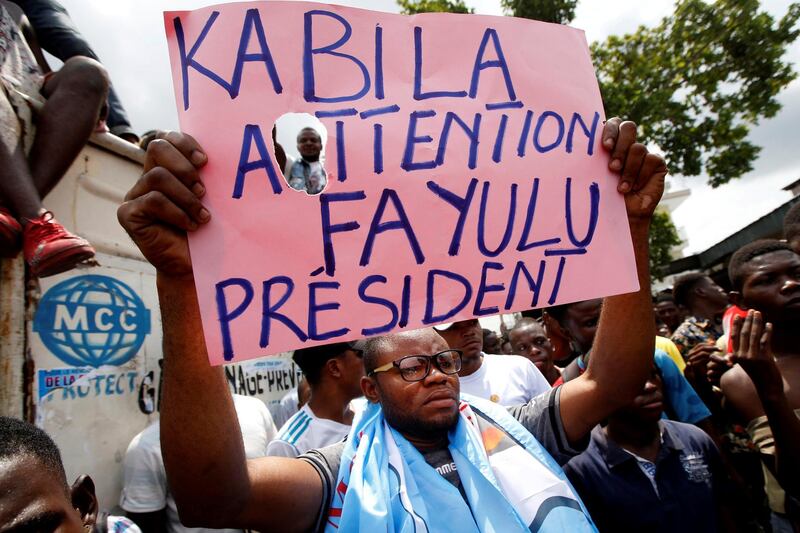Just days after Felix Tshisekedi won a shocking victory in the Democratic Republic of the Congo’s much-delayed and disputed election, two influential regional bodies called for a recount.
The Southern African Development Community, the region’s answer to the GCC, demanded the measure “to provide the necessary reassurance to both winners and losers”. The International Conference of the Great Lakes Region, which includes Kinshasa allies Angola and the Republic of Congo, said it was needed to "guarantee the transparency of the results".
It follows two weeks of political crisis since the Congolese voted on December 30, sparking fears of nationwide violence that could destabilise the wider region. France and the US have already sent troops.
The country has long been a flashpoint for regional conflict. Dubbed “Africa’s World War”, a 1997-2002 civil war in the mineral-rich DRC absorbed neighbouring states and killed 5 million people.
Last Thursday, the DRC’s much-maligned electoral commission, known as CENI, declared Mr Tshisekedi – the son of a fearless opposition leader – the victor of December’s vote. Pre-election polls put him 20 points behind main opposition candidate Martin Fayulu, a former oil executive.
_______________
Read more:
Supporters of Congo candidate gather to denounce ‘fraud’
Opposition leader Felix Tshisekedi wins DRC presidential poll
Congolese voters suspicious following election results delay
_______________
The result shocked both men and international observers, who had feared the election would be rigged in favour of Emmanuel Shadary, outgoing president Joseph Kabila’s handpicked successor. In the end, Mr Shadary came a distant third.
Mr Tshisekedi’s victory should be cause for celebration, marking the first democratic of transition of power in the vast central African country since Patrice Lumumba in 1960, following independence from Belgium. But Mr Lumumba’s toppling and murder just four months later was an early indicator of the ferocity and dysfunction of Congolese politics.
Many now believe that Mr Kabila, who has ruled since 2001 when his father, then President Laurent Kabila, was assassinated, struck a deal with Mr Tshisekedi to keep Mr Fayulu out of power. Mr Kabila, 47, was due to step down in 2016, but repeatedly delayed elections, inspiring protests that killed dozens.
"The very low levels of support for the ruling party's candidate, Mr Shadary, would have made it very difficult for the ruling elite to rig it in his favour, which potentially forced Mr Kabila to make a 'plan B' with Mr Tshisekedi," Thomas Murphy, intelligence analyst at Risk Advisory, told The National.
The accusation is bolstered by the DRC’s influential Catholic Church, one of the country’s only functioning institutions, which deployed 40,000 election monitors in December. The Church has claimed that its data conflicts with the results and has called for the rightful winner to be declared, stopping short of naming Mr Fayulu.
An opinion poll published on December 28 by the New York-based Congo Research Group indicated that 44 per cent of Congolese supported Mr Fayulu, but official results put him on 34.8 per cent, slightly below Mr Tshisekedi’s 38.6 per cent.
On Saturday, Mr Fayulu filed a petition to the country’s highest court and will hear back within eight days. But the presidential hopeful's prospects appear slim as Kabila loyalists fill the court.
Criticism of the vote has not been limited to Africa. France, Belgium, the United States and Britain have all expressed deep concern at the reports of widespread irregularities and the ensuing unrest that has hit the country. But their intervention may be too late for the former Exxon Mobil executive.
"Mr Fayulu's only window is international support, which is now not enough to change the course of events," Jean-Claude Maswana, a Tokyo-based Congolese economist, told The National.
Meanwhile, over the weekend, the coalition of parties backing Mr Kabila – who retains loose control over the judiciary and the military – won a majority in the DRC’s 500-seat legislative assembly.
Mr Tsishekedi would therefore be “a lame duck president”, unable to implement reforms that Mr Kabila and the ruling elite dislike, said Mr Murphy.
“Mr Kabila traded the presidency for parliament with Mr Tshisekedi,” Mr Maswana speculated.
Importantly, the country’s constitution does not bar Mr Kabila from pursuing a third term in office at a later date, in the manner of Vladimir Putin, who sandwiched four years as Russian prime minister between two stints as president. There are, however, no indications that Mr Kabila is seeking another run.
Today, the 80 million-strong DRC is home to rampant corruption, sexual violence, malnutrition and constant, patchy conflict. That is in spite of – or perhaps because of – vast mineral resources, including cobalt, a vital component in smartphones and electric cars.
A grim Ebola outbreak in the build-up to December’s election caused Mr Kabila to exclude more than one million voters.
So far, Mr Fayulu has been fairly muted and the situation has remained relatively calm.
But that could quickly change. “If the court does dismiss Mr Fayulu’s petition – which we think is the most likely outcome – we anticipate that he will probably call on his backers to protest,” said Mr Murphy.
“The security forces tend to respond to any protests will force, including tear gas and, on some occasions, live rounds.”





